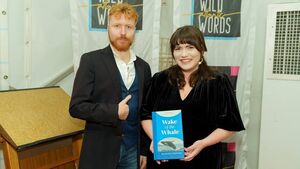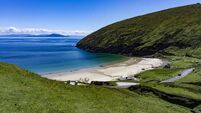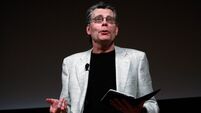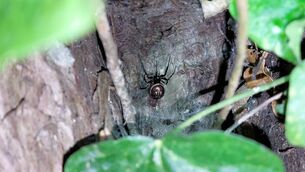Brilliant portrait of a dark part of Mayo’s history

Daniel Wade and Alice Kinsella at the launch of their book, Wake of the Whale, during the Wild Atlantic Words literary festival in Castlebar last October. Picture: John Mee Photography
Anyone who has ever been to the beautiful Inishkeas off the coast of Erris can attest to the magical nature of the islands, an otherworldly feeling to the place.
In all my travels around the world, I recall few places that had that sense of a place utterly apart. There was a deeply spiritual feeling to the place, perhaps informed by its haunting history and the tragedy of what marked the end of its people on the islands. Certainly, no place in Ireland has given me that sense of detachment, of splendid isolation and almost feeling like you were between two worlds.
Such a place is therefore a fitting setting for a book that asks deep and important questions about not just our past but our future. , a most extraordinary book by Alice Kinsella and Daniel Wade, was released late last year.
That Inishkea South and Ardelly Point, near Blacksod, were home to two Norwegian-owned whaling stations for a period in the early part of the 20th century is an under-acknowledged part of Mayo’s history. Certainly, it was something Kinsella, a renowned writer and poet who has called this county home for most of her life, was entirely unaware of until speaking to a tour guide at Blacksod Lighthouse four years ago.
Hearing the words ‘remains of a whaling station’ in reference to the tidal island of Rusheen, just off the coast of Inishkea South, stopped her in her tracks and was the start of a fascinating and deeply personal journey of discovery that anyone who has read the book has been fortunate enough to be brought on.
It lit a fuse and became an obsession for Kinsella. It combined Mayo – the place she calls home and clearly cares so much for – and the climate crisis, the two topics Kinsella is most passionate about.
As someone who has never eaten animals, never mind kill one, she realised soon enough that her perspective was partial. She wanted someone working with her who could enunciate the thoughts of the men who went out to sea to harpoon and kill whales. While it might seem barbaric to many now, it was a different time and ways of putting food on the table in this corner of Erris at the beginning of the 20th century were far more limited than now.
Her partner Daniel Wade, who has written extensively about the sea and has considerable knowledge of Ireland’s maritime history, stepped forward and the two fulfill roles in the book, Alice as ‘Watcher’ and Daniel as ‘Mariner’, which as well as being versions of themselves, also encapsulate the reality of the time with the men going out to sea and the women watching from the shore, minding the families.
‘Watcher’ uses this local history of the whaling stations in Erris to ask some very relevant and thought-provoking questions about colonialism and the climate crisis around the globe. ‘Mariner’ tries to explore the ‘why’. Why did men hunt whales to the brink of extinction? The book is dedicated to the 894 whales who were known to be killed in Mayo waters in the early 20th century. The true figure of those killed but not retrieved is thought to be much higher.
‘Mariner’ gives a voice to those men with great understanding and, in the case of the Iniskea islanders, detailing their stoicism and non-conformism. ‘Watcher’ details this dynamic thus:
The history of the whaling stations is layered and fascinating, not just in Erris but worldwide. Kinsella and Wade delve into this, but their book is far from a simple history tome. It is one of the most multi-layered books you will ever encounter. ‘Genre-bending’ is how it is described on the back cover, a wonderful blend of history, poetry, sea shanties and documentary.
It takes us from the history of the whaling stations in Erris to more modern controversies and conflicts such as the Corrib gas project at the other end of the barony.
It earned stellar reviews, such as this one from the :
Good books force us to look into our own convictions and challenge them. Of course, you have to be willing to have your world view challenged, too. With modern-day echo chambers, not everyone is willing to go on such a journey.
is a timely reminder that we are only caretakers of where we call home.
In Ireland, we have a deep-rooted need to own property, to call it ours. It is almost certainly a legacy of our colonial past, where our forebears were pulled from their lands.
But with such a right and - some might say, privilege - comes responsibility. Though you may own the land, it will be there long after you, and it is your deep responsibility to care for it.
As I write here on Dooega on Achill Island, our horizons are framed by two mountains at the back of our home, Minaun to the north-west and Cnoc Mór to the north-east while to the front and south, the high cliffs of Clare Island are the most imposing of the island vistas that also take in Inishturk and, on a clear day, Inishbofin and Inishark in Co Galway.
It is a spectacular setting, and when I look out to those islands and the majesty of Achill Island all around us, I am reminded of the natural beauty we inherited and must bequeath to those who follow us. At land and at sea.
Achill was home to a basking shark industry for decades, like Erris was home to whaling stations. When looked at from a 21st century perspective, those practices appear archaic and indeed barbaric.
It is entirely wrong to be judgmental about people in a different time, in a time we did not live in and where the same opportunities we have simply did not exist. It is more fitting to learn from it and ask ourselves the question what is our generation doing to protect this precious earth for future generations?
What book may be written about us in decades to come? Will we have blood on our hands? Or will we learn the lessons from history?





